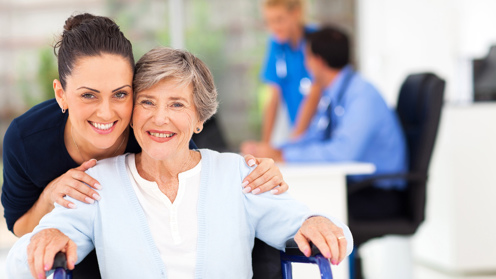Your phone buzzes; you pick it up and learn that your elderly parent has been rushed to hospital after they accidentally fell and suffered a blow to the head. Fortunately, they were not severely injured, but they’ll stay at the hospital overnight to ensure they are okay. Could it be time to find them a caregiver? If this is a question you have been pondering, here are 12 Indicators That Your Loved One Might Need Senior Care.
It can be challenging to tell when it’s time for a loved one to get a caregiver. Often, we want to think that our loved ones can take care of themselves and don’t need any help. But, sometimes, nothing could be further from the truth.
Seniors often need assistance with day-to-day tasks, and if they aren’t getting the help they need, it can lead to bigger problems. Let’s discuss six signs that your senior loved one needs a caregiver.
1. Struggling to Complete Everyday Tasks
If your loved one struggles to complete everyday tasks, it may be time to intervene by getting them a caregiver. Everyday tasks include bathing, dressing, and using the restroom. If they have difficulty with these tasks, consider getting them the help they need.
A caregiver can assist with these activities and ensure your loved one is safe and comfortable. They may also help with other tasks around the house, such as light housekeeping or grocery shopping.
Getting a caregiver for your loved ones doesn’t mean you’re giving up on them. It implies you’re proactively looking for ways to improve their health and happiness.
2. Persistent Falls or Accidents
The appearance of bruises or cuts on your aging loved one’s body could mean one thing- persistent accidents. If you notice your elderly loved one has been experiencing more falls or accidents than usual, they likely need extra help. This is especially true if they struggle to get up after a fall or are constantly bumping into things- which may be difficult for them, no matter how hard they attempt to deny it.
Be aware of this and exercise patience when helping someone in such a situation. A caregiver can help them stay safe by providing assistance and supervision.
3. A Change in Eating Habits
Nutrition is pivotal to the well-being of any individual, and aging parents or relatives are no exception. Thus, if your loved one isn’t eating as well as they used to, it indicates they need help. A tell-tale sign could be an empty pantry. In that case, caregivers can ensure they get the nutrition they need.
You may help in other ways, from cooking for them and encouraging them to eat to simply spending more time together. Whatever you do, ensure your loved one knows that you’re there for them and intend to help in any way possible.
4. Change in Mental State
If you’ve noticed your loved one’s mental state has changed, and they’re no longer as sharp as they used to be, it may be time to find them a helping hand. A decline in mental faculties can lead to a loss of independence and an increased risk of accidents or injury.
Fortunately, a caregiver’s presence can help ensure their state of mind doesn’t adversely affect them. If they are on medication, a caregiver can help them take their medicine on time and as prescribed. They may also provide stimulating conversation and companionship, a boon to your loved one’s mental health.
5. Increased Reclusiveness
If your loved one used to be social and outgoing but has become more reclusive, hiring a caregiver might be handy. It could be they’re unable to drive or don’t feel safe leaving the house. Whatever the reason, it could mean something is amiss if they no longer enjoy their favorite activities.
Please pay attention to changes like this, as they can indicate underlying health problems. If they have suddenly lost interest in their favorite hobbies or activities, it’s worth investigating further to see if there’s anything you can do to help them get back to enjoying their life.
6. Physical Changes
Watch out for physical signs that could set alarm bells ringing, including weight loss or a sudden decrease in mobility. Such changes are red flags indicating a decline in health. Although hiring a caregiver can be difficult, it may help your loved one live a healthier life.
If you’re still unsure whether your loved one needs a caregiver, speak to their doctor. They can give you more information about your senior’s situation and whether or not a caregiver would be beneficial. Otherwise, don’t hesitate to contact a professional caregiver today if you notice any of these or other signs.


















